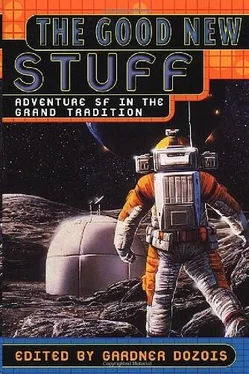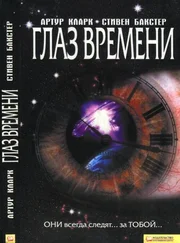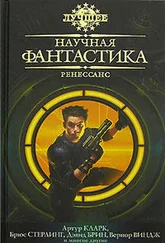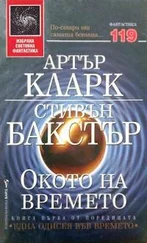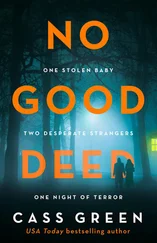Стивен Бакстер - The Good New Stuff
Здесь есть возможность читать онлайн «Стивен Бакстер - The Good New Stuff» весь текст электронной книги совершенно бесплатно (целиком полную версию без сокращений). В некоторых случаях можно слушать аудио, скачать через торрент в формате fb2 и присутствует краткое содержание. Год выпуска: 2002, ISBN: 2002, Издательство: St. Martin's Griffin, Жанр: Фантастика и фэнтези, на английском языке. Описание произведения, (предисловие) а так же отзывы посетителей доступны на портале библиотеки ЛибКат.
- Название:The Good New Stuff
- Автор:
- Издательство:St. Martin's Griffin
- Жанр:
- Год:2002
- ISBN:0-312-26456-9
- Рейтинг книги:3 / 5. Голосов: 1
-
Избранное:Добавить в избранное
- Отзывы:
-
Ваша оценка:
- 60
- 1
- 2
- 3
- 4
- 5
The Good New Stuff: краткое содержание, описание и аннотация
Предлагаем к чтению аннотацию, описание, краткое содержание или предисловие (зависит от того, что написал сам автор книги «The Good New Stuff»). Если вы не нашли необходимую информацию о книге — напишите в комментариях, мы постараемся отыскать её.
The Good New Stuff — читать онлайн бесплатно полную книгу (весь текст) целиком
Ниже представлен текст книги, разбитый по страницам. Система сохранения места последней прочитанной страницы, позволяет с удобством читать онлайн бесплатно книгу «The Good New Stuff», без необходимости каждый раз заново искать на чём Вы остановились. Поставьте закладку, и сможете в любой момент перейти на страницу, на которой закончили чтение.
Интервал:
Закладка:
Chemical imbalances shifted, found a new equilibrium.
"Bravo!" The Harlequin hauled the Minotaur to his feet, clapped him on the back. "We'll be famous friends, you and I. With luck, we may even keep each other alive, eh?"
It was a new idea to the Minotaur, and a disquieting, perhaps even blasphemous, one. But he grinned shyly, and dipped his head. He liked the little fellow. "Sure," he said.
The sun was setting. The Minotaur felt the coolness coming off of the sea, heard the people scurrying to their homes. He carefully tied the ceramics into his cloth, and knotted it onto his belt. He stood, leaning wearily on his staff. Yarrow had not yet come for him, and he was glad; he hoped she had gone off on her own, forgotten him, left him behind forever. But the city's rhythms demanded that he leave, though he had nowhere to go, and he obeyed.
He went down into the city, taking the turns by random whim. He could not be said to be lost, for one place was as good as another to him.
It was by mistake, though, that he found himself in a building whose doors were never shut, whose windows were not shuttered. He had entered, thinking the way yet another alley. No doors barred progress down halls or into rooms. Still, he felt closed in. The corridors smelled— there was the male stench and the female, and intermingled with them, almost overpowering, an insect smell, the odor of something large and larval.
He stopped. Things stirred about him. There was the pat of bare feet on stone, the slow breathing of many people, and— again— a sluggish movement of creatures larger than anything smelling thus should be. People were gathering; twelve, eighteen, more. They surrounded him. He could tell they were all naked, for there was not the whisper of cloth on cloth. Some walked as if they had almost forgotten how. In the distance, he thought he could hear someone crawling.
"Who are you?" Panic touched him lightly; sourceless, pure.
"Whrrarrwr," began one of the people. He stopped, swallowed, tried again. "Why are you in the Hive?" His voice sounded forced, as if he were unused to speech. "Why are you here? You are a creature of the old days, of the Lords. This is no place for you."
"I took a wrong turn," the Minotaur said simply. Then, when there was no reply, "Who are you people? Why do you cohabit with insects?"
Someone coughed and sputtered and made hacking noises. A second joined her, making the same sounds, and then others, and yet more. With a start, the Minotaur realized they were laughing at him. "Is it religious or political?" he demanded. "Are you seeking transcendence?"
"We are trying to become victims," the speaker said. "Does that help you understand?" He was growing angry. "How can we explain ourselves to you, Old Fossil? You never performed a free act in your life."
Some whim, then, of internal chemistry made him want these strangers, these creatures, to understand him. It was the same compulsion that had forced him to empty himself to the newshawks before Yarrow appeared to lead him out of the arena.
"I had a friend, another immortal," the Minotaur said. "Together, we cheated the patterning instinct by making our own pattern, a safe, strong one, we were like" — his short, powerful fingers joined, closing around the staff, intermeshing—"like this, you see. And it worked, it worked for years. It was only when our predators worked within the patterns we formed that we were destroyed." The words gushed out, and he trembled as the hormones that might give him the power to explain almost keyed in.
But the communards did not want to understand. They closed in on him, their laughter growing sharper, with more of a bark, more of a bite to it. Their feeble footsteps paltered closer, and behind them the chitinous whine grew louder, was joined by that of more insects, and more, until all the world seemed to buzz. The Minotaur flinched back.
And then they seemed to hesitate in confusion. They milled about uncertainly for a moment, then parted, and quick, small footsteps passed through them, ran to his side. A cool, smooth hand took his.
"Come home with me," Yarrow said. And he followed.
He dreamed of the arena that night, of the hot white sands underfoot that drank up his friend's blood. The Harlequin's body lay limp at his feet, and the bronze knife was as heavy as guilt in his hands.
It was as if his eyes had opened, as if he were seeing clearly for the first time. He stared around the encircling bleachers, and every detail burned into his brain.
The people were graceful and well-dressed; they might almost have been the old Lords, deposed these many years ago in violent public revulsion. The Woman sat ringside. Her silver mask rested lightly on the lip of the white limestone wall, beside a small bowl of orange ices. She held a spoon in her hand, cocked lightly upward.
The Minotaur stared into her blazing green eyes, and read in them a fierce triumph, an obscene gloating, a very specific and direct lust. She had hunted him out of hiding, stripped him of his protection, and chivvied him into the open. She had forced him to rise to his destiny. To enter the arena.
Try though he might, the Minotaur could not awaken. If he had not known all this to be a dream, he would have gone mad.
Waking, he found himself already dressed, the last bit of breakfast in his hand. He dropped it, unnerved by this transition. Yarrow was cleaning the kitchen walls, singing an almost tuneless made-up song under her breath.
"Why aren't you out being taught?" he demanded, trying to cover over his unease with words. She stopped singing. "Well? Answer me!"
"I'm learning from you," she said quietly.
"Learning what?" She did not answer. "Learning how to tend to a cripple? Or maybe how a beggar lives? Hey? What could you possibly learn from me?"
She flung a wet cloth to the floor. "You won't tell me anything," she cried. "I ask you and you won't tell me."
"Go home to your mother," he said.
"I can't." She was crying now. "She told me to take care of you. She said not to come back until my task was done."
The Minotaur bowed his head. Whatever else she might or might not be, the mother had the casual arrogance of an immortal. Even he could be surprised by it.
"Why won't you tell me anything?"
"Go and fetch me my stick."
Bleak plains dominated the southern continent, and the Minotaur came to know them well. The carnival worked the long route, the four-year circuit of small towns running up the coast and then inland to the fringes of the Severna Desert.
Creeping across the plains, the carnival was small, never more than eight hands of wagons and often fewer. But when the paper lanterns had been lit, the fairway laid out, the holographic-woven canvases blazing neon-bright, they created a fantasy city that stretched to the edge of forever.
The Minotaur grunted. Muscles glistening, he bent the metal bar across his chest. Portions of the audience were breathing heavily.
It was the last performance of the evening. Outside the hot, crowded tent, the fairgoers were thinning, growing quieter. The Minotaur was clad only in a stained white loincloth. He liked to have room to sweat.
Applause. He threw the bar to the stage and shouted: "My last stunt! I'll need five volunteers!" He chose the four heaviest, and the one who blushed most prettily. Her he helped up on the stage, and set in the middle of the lifting bench, a pair of hefty bouergers to either side.
The Minotaur slid his head under the bench. His face emerged between the young woman's legs, and she shrieked and drew them up on the bench. The audience howled. He rolled his eyes, flared his nostrils. And indeed, she did have a pleasant scent.
Читать дальшеИнтервал:
Закладка:
Похожие книги на «The Good New Stuff»
Представляем Вашему вниманию похожие книги на «The Good New Stuff» списком для выбора. Мы отобрали схожую по названию и смыслу литературу в надежде предоставить читателям больше вариантов отыскать новые, интересные, ещё непрочитанные произведения.
Обсуждение, отзывы о книге «The Good New Stuff» и просто собственные мнения читателей. Оставьте ваши комментарии, напишите, что Вы думаете о произведении, его смысле или главных героях. Укажите что конкретно понравилось, а что нет, и почему Вы так считаете.
